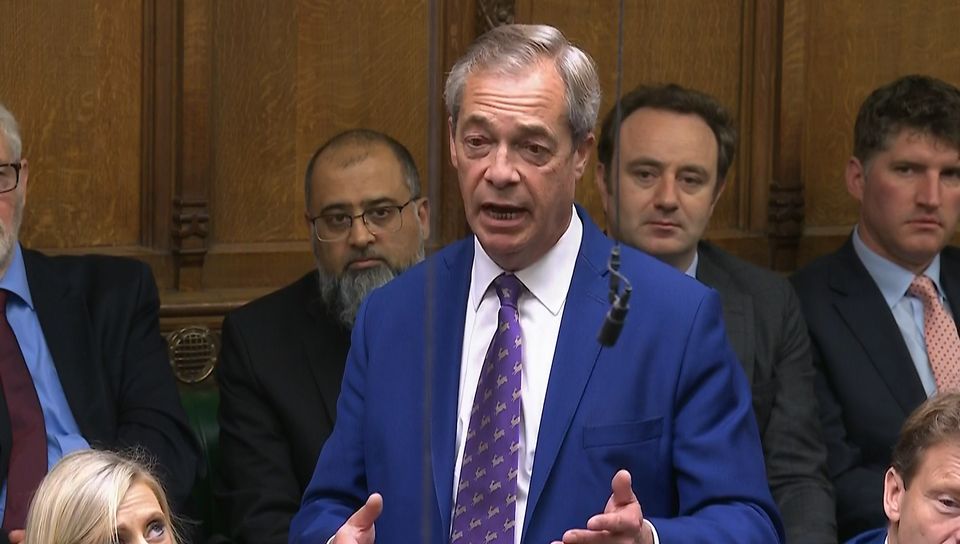A review into in-country asylum applications is under way, the Home Secretary has confirmed, as another MP offered to drive a constituent to the airport himself to face deportation.
Yvette Cooper told the Commons on Monday her Government is looking at the way asylum seekers make applications within the UK, after having already changed visa requirements for visitors from Colombia and Jordan earlier this year.
Lincoln Jopp, the Conservative MP for Spelthorne, later said he had heard from a constituent who wanted to speed up an EU Settlement Scheme (EUSS) application, only for Mr Jopp’s team to find he had previously been deported.
He urged Ms Cooper to change the rules “at the stroke of her pen and that anyone who is subject to a deportation order just gets deported”.
Reform UK leader Nigel Farage speaking in the Commons (House of Commons/UK Parliament)
Taking questions about migration and border security, Ms Cooper told the Commons: “We are clear that net migration needs to come down after the huge increase. We also need to restore order to the asylum system. Part of that is going after the criminal gangs who are undermining border security and putting lives at risk, and tackling small boat crossings.”
Reform UK leader Nigel Farage had said 2023 was a “year of shame for a government that had repeatedly promised net migration of tens of thousands a year, not nearly a million” and warned the Conservatives may “never be forgiven for it”.
He calculated that of the 84,000 asylum applications in 2023, around 69% were not linked to small boat crossings across the English Channel, and asked: “Were they overstayers? Were they student visas? Who were the 69%?”
Mr Farage nodded as Ms Cooper replied: “There is also an issue about the increases that we have seen around in-country asylum applications and we have instigated a review into the increase in in-country asylum applications to get to the bottom of what is happening and why.
“There were two areas where we found that the previous government’s decision to remove visa requirements for visitors had led to significant increase in asylum applications for people who were coming as visitors instead.
“We have actually reversed those changes that were made by the previous Conservative government and reintroduced visitor visa requirements for those countries.”
Home Office minister Seema Malhotra confirmed earlier this year that the Government had introduced a visa requirement on all visitors from Colombia and Jordan, both countries where decisions to lift visa requirements – in 2022 and 2024 – had resulted in “a significant and sustained increase in asylum claims”.
Later in the debate, Mr Jopp told MPs: “A constituent wrote to me recently asking if I could get a hurry up on his application under the EUSS. It turns out that he’s actually subject to a deportation order, and we actually did deport him in 2018.
“He managed to get back into the country somehow and make his application under the EUSS. The Home Office told me last week that they can’t deport him until his application under the EUSS has been played out including all the appeals.
“So he made his application in 2020. It’s now nearly the end of 2024. In the spirit of bipartisanship, can I suggest that the Home Secretary changes the rules with the stroke of her pen and that anyone who is subject to a deportation order just gets deported?
“And in a similar spirit, if she can get it done by Friday, I’ll gladly drive him to the airport myself.”
Ms Cooper said the Conservatives had four years since the EUSS was introduced “to be able to deal with some of these issues” but added: “We actually do take seriously the need to better speed up and enforce returns for those who have no right to be here.”
Barry Gardiner, the Labour MP for Brent West, said the Government had inherited a “chaotic” immigration situation and asked: “Does (Ms Cooper) accept that in a world that is so interconnected as ours, migration can no longer adequately be managed by treaties which are now more than 70 years out of date and that we need to cooperate with our international partners to create a new structure and a new settlement for managing global migration?”
Ms Cooper replied that “countries do need to work together and do need to look far more about some of the causes of migration”.
She later said that her Government was talking to the Iraqi government and Kurdistan regional authorities about biometrics “because that makes it easier then to prevent people delaying either asylum claims being resolved or returns being agreed by not having papers, and where there are biometrics in place, that makes things much faster”.
